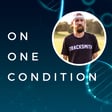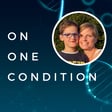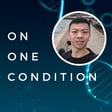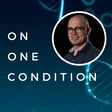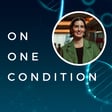Become a Creator today!Start creating today - Share your story with the world!
Start for free
00:00:00
00:00:01

Episode 67: Robert Hay - Haemophilia
Rob shares his personal journey growing up with severe haemophilia A, a rare bleeding disorder. Diagnosed as a baby due to family history, Rob and his brothers inherited the condition from their mother, who is a carrier of a mutated gene leading to haemophilia. His story spans from childhood limitations, frequent injections, and a sense of isolation, to the profound impact a life-changing treatment can have. Rob also reflects on what it means to work in clinical research while being directly impacted by its advances. This episode is a compelling testament to resilience, progress in medicine, and the hope that future generations may never experience what he and his brothers did.
The song that Rob chose is Iris by The Goo Goo Dolls.
Transcript
Introduction to 'On One Condition' and Rob Hay
00:00:00
Speaker
Hi, I'm Sylvain Bertolo and you're listening to On One Condition, a podcast to raise awareness about health conditions by listening to people who live them every day. My guest today is a colleague of mine, so I'm very happy to have him on, Rob Hay, and we're going to talk about hemophilia.
00:00:20
Speaker
Hi Rob, how are you doing? Hi Sylvain, very well thank you and thank you for having me on the podcast. Oh, no, it's a pleasure. You shared with me recently about hemophilia and then you continued me to invite you on.
00:00:36
Speaker
I'm sure there are some myths that we're going to bust. Definitely. As you know, I love starting with a
Discovering and Living with Hemophilia
00:00:44
Speaker
song. So which song did you choose and why?
00:00:48
Speaker
I had to have a think about this one. There are quite a few. I went with Iris by the Goo Goo Dolls. Okay. ah Quite a random one. but i So I lived in Korea for eight years and karaoke there is very, very popular.
00:01:02
Speaker
And that was always a song that I would just do at least once during the hour. It's a love song, obviously, and it's quite cheesy, but I think it's just a guilty pleasure I've had since I was in my early 20s and I've just kept it since then. I just keep going back to it.
00:01:19
Speaker
But also you did mention about songs that I like to dance to. My favourite DJ is Avicii and i've I've seen him three times three times live and and just love all his songs really but yeah Iris by the Goo Goo Dolls is my answer to that question nice we'll have to go on a karaoke together because I'd love to see that I'd have to have quite a few beers and soju to get to that point but yeah it would be a good time Okay, noted.
00:01:49
Speaker
Right. So we're going to move to something a bit more serious. Hemophilia. And I hear that it runs in your family. So could you start with sharing with us how your family realized that you have hemophilia?
00:02:06
Speaker
yeah My mum is a carrier, so her X gene is the faulty carrier. The genetics of it is basically a 50-50 chance of her passing on to her offspring.
00:02:18
Speaker
I have two older brothers who are 12 and 10 years older than me. And when they were born, my parents weren't aware that my mum was a carrier at that point because we hadn't seen it in in my mum's family at all.
00:02:29
Speaker
But when my oldest brother, Charlie, was born, when he was a few months old, they found bruises on his body and then took him to hospital try and find out what the cause was.
00:02:40
Speaker
And obviously the hospital was a bit alarmed. because because he had unexplicable bruises on his body. But after some tests, they found out that he had severe hemophilia which is factor eight deficiency.
00:02:52
Speaker
Back then in the eighties, medicine was very, very expensive. the The recombinant factor rate was very expensive. So Charlie had it probably the worst out of all of us with the bruises.
00:03:05
Speaker
And so my second oldest brother, James, who's 10 years older than me, he also has it. And then I have it as well. so We lost the genetic lottery in that sense. It's statistical.
00:03:19
Speaker
It's quite unlikely that all of us would have got it, but we did all get it.
Impact on Social Life and Sports
00:03:23
Speaker
And yeah, so that's that's how how we how we came about knowing that we had hemophilia. Okay. They didn't know whether I had it or not until I was born, but that was a risk they were willing to take at that point.
00:03:34
Speaker
So for you, was it confirmed just through blood draw? I assume so. Yeah. Because of what happened with Charlie, they knew they had to test but jim James and i as soon as we were born.
00:03:48
Speaker
Okay. but We'll come back to treatment. Cause I think that's, that's interesting what you mentioned here How did it impact you as you were growing up?
00:03:59
Speaker
Because you were born with it, obviously, and I guess it was already known in the family. So did that still have an impact on you as as you were growing up?
00:04:13
Speaker
Definitely. Yeah. So i never participated in contact sports at school. So football and rugby were sort of, everyone was doing it during a school, PE and and sports.
00:04:28
Speaker
And I could never participate because of the risk of internal bleeding. from the contact sport and when I was a teenager or preteen my mum thought it was a good idea to enlist me in taekwondo thinking that it was going to focus my preteen anger and rage And it did, it did help, but I just wanted to spar because what's the point in learning all of those moves if you can't use them in a controlled environment?
00:05:00
Speaker
But i wasn't allowed that either, even with all the padding. And that sort of frustrated me quite a bit growing up. And it meant that also I couldn't, i'm I'm not interested in football now at all or any sort of mainstream sports because I can't play them.
00:05:15
Speaker
I would say it did impact me a lot in terms of the social aspect and education, but also from when I was born, i have vivid memories. So my dad was the one that did the injections for for us until we were about nine or 10 years old.
00:05:33
Speaker
And as a child, because babies having our ah intravenous injection is very difficult and because all the fat. ah I remember being in hospital, must have been about four or five years old and having a ah can't remember what it's called, but it's like a metal piece, like a 50 pence piece that they put and in your in your torso. So it reflects the vein to the surface.
00:05:58
Speaker
okay They had to do that twice because the first one got infected and then it was on the other side of my body. So I have quite vivid and memories of and my dad doing the injection every two days.
00:06:11
Speaker
and It wasn't painful. It was it was uncomfortable. yeah But it's just one of those things, you know, that's that's the the that's what comes with the hemophilia.
00:06:22
Speaker
And then as soon as I was able, it was go I was doing intravenous injection into my arm every two days. So yeah, definitely had an impact my whole life, but less so now Yeah, yeah.
00:06:36
Speaker
So did it lead to isolation at all? i I remember when I was at the equivalent of high school, I had a friend in my class who has hemophilia, and it felt like he could it couldn't really fit in, in a way. And and one of the biggest things was thought actually, because he could he could not do any of the sports we were doing.
00:07:05
Speaker
it felt like it was a cause for isolation in a way, unfortunately. It definitely was. Yeah. So especially during sports period, my classmates would be all playing together and you miss out on that bonding, I think, that you get from team games.
00:07:23
Speaker
So I would literally be sitting where the PE teacher lounges or whatever, just watching people play play football and rugby. Yeah. I wasn't envious of not being able to play the game because I didn't like those games. I didn't like those sports. So that was fine. It was more the fact that yeah the social aspect, the isolation, think had my school been more aware, the only issue was i was the only individual who wasn't able to participate in those sports.
00:07:50
Speaker
So there was no alternative for me, which is a bit unfortunate. When I reached my 20s, I got into badminton, even though that was ah to an extent a contact sport in that you don't contact with other people, but it is quite strenuous on your joints.
00:08:08
Speaker
I could deal with the consequences of that and it wouldn't be affected by by the other players.
Understanding Hemophilia and Its Treatment
00:08:15
Speaker
I think I have a competitive nature when it comes to why I just like to win.
00:08:19
Speaker
Picking up badminton in my 20s was really good because that was the only sport I've ever really enjoyed playing. Yeah. And I really threw myself into that. So, and I got, I made some very lifelong friends from badminton.
00:08:32
Speaker
Yeah. Even though in my upbringing, there was isolation, but as an adult, no, not so much. i i was able to pick up a sport and and enjoy it. Okay. Interesting. Earlier, you mentioned internal bleeding.
00:08:45
Speaker
Mm-hmm. And that's something I discovered when we were talking recently. that There's a myth that hemophilia is that you have to have an open wound and then you keep bleeding and bleeding and bleeding, but that's not the case. So can you share with us how it affects you and what the risks are?
00:09:07
Speaker
Yeah, the myth is is definitely true because when i whenever I've told people i have hemophilia, they go, oh, that's the that's the disease where you just don't stop bleeding. say, yeah, but it's it's a little bit more complex than that. but But that is true. If I do get an open wound, it is cause for alarm.
00:09:25
Speaker
But open wounds don't happen that often. But if I were to bump myself on a piece of furniture or anything like that, especially around a joint, that would lead to either a bruise on the surface of the skin if it's not a joint or an internal bleed in the joint.
00:09:42
Speaker
And that can be very dangerous, especially if it's in on my legs or in my knees or my ankles because of walking. hmm. But not only if i didn't bump myself on or I was being clumsy or whatever, if I missed my medication, my my injection every two days, would end up getting a bleed in my ankles most often because of just walking.
00:10:09
Speaker
really so i remember when i was about nine or ten years old i went to the us with my mum and my mum didn't know how to do the injections so we were struggling to find hospitals along this tour around north america and where they would give me the injection i was there for about two weeks i remember by the end of it in think it was toronto or some canadian city i was actually being pushed around in a wheelchair because My ankles, the bleeds were so severe, really i couldn't walk.
00:10:39
Speaker
And that would happen probably instead of every two days, let's say I hadn't had an injection for three or four days, five days maybe, it would get to the point where I wouldn't be able to bend my my ankle.
00:10:51
Speaker
So I'll be hobbling, basically. And the internal bleeds just get worse and worse over time without medication. they don't stop at all? Basically, yeah, because the what is missing, the the factor VIII, is what causes the clotting, the cascading clotting effect.
00:11:07
Speaker
And without that, no clotting occurs, and the joint will just continuously bleed until factor VIII is injected. That's incredible. So even just walking would generate an internal bleed.
00:11:23
Speaker
And is that still the case now if you stop the injection? ah yeah So I think had my brothers and I not had modern medicine and not had human-made factor VIII, we would most likely be dead now from the internal bleeds.
00:11:39
Speaker
And if not, we would definitely be wheelchair-bound. It makes you wonder how people lived with hemophilia before treatment was available.
00:11:50
Speaker
But then when you have an injection, factor eight helps with while clotting and and closing the the internal wounds, essentially. yeah so Do you have to do anything else?
00:12:03
Speaker
No, not really. the hospital would sometimes prescribe us with, can't remember the acid, but there's a certain acid that would help if we got a bleed. Although and my brothers would never use the stuff because we're just we would never think about it. But no, usually the factor 8, we'll be given prophylaxis of every two days and that should prevent bleeds.
00:12:25
Speaker
Yeah. How about if you have to have an intervention like surgery? Yeah, so we need to let the surgeon know beforehand. So we're all patients at St. Thomas' in Westminster, in London.
00:12:41
Speaker
And any major surgery, they would have to be consulted with the hemophilia department first before anything would go ahead. Okay. Okay. Well, let's talk about medication, actually. So you said that it's your two brothers had it worse than you because of the treatments at the time.
00:13:01
Speaker
Why? What has changed? So when my brothers were born in the 80s, the medication was fairly new and extremely expensive for the NHS to provide.
00:13:11
Speaker
Mm-hmm. So when they were born, the human have made factor eight was used to cure the symptoms of hemophilia or stop the bleeding essentially.
00:13:25
Speaker
So they were only allowed to have the injections when they got a bleed. So what that meant was their childhood was full of joint bleeds, which meant that they have now got arthritis in many of their joints.
00:13:40
Speaker
Oh, okay. But when I was born, the medication was 10 years, 12 years older, significantly cheaper, and now was being used as prophylaxis as opposed to treatment for the bleeds.
00:13:55
Speaker
Yeah. Okay. So my joints are relatively healthy compared to their joints because I didn't have as many bleeds in my joints as they did when I was a child. Although I do have very mild arthritis in my right elbow just from targeted bleeds when I was young, but it doesn't, it's nowhere near as bad as my brothers had it.
00:14:15
Speaker
Yeah. And is it still injections nowadays? Like, do you still have to do injections every two days? No, so from two or three years ago, so we were on Factor 8 for our whole lives, and a new product was released called Em... probably going butcher it here, but it's Emikizumab.
00:14:36
Speaker
I don't know why they've made it so difficult to pronounce, but yeah, but that the the product name is Hemlibra. actually first heard about it when I first started working at CRS Cube.
00:14:48
Speaker
The NHS, the St. Thomas's had had mentioned to us that this new product been released. It's gone through all the trials and everything, and they're rolling it out to hemophilia patients. Because I was living in Korea, i had to have come back to the UK for six weeks because they were doing their own sort of PMS post post-marketing surveillance on the product.
00:15:11
Speaker
Because the NHS are very careful about any products that they use, even after it's gone through phase three. So they're rolling it out quite slowly and carefully.
00:15:23
Speaker
So we'd have to go through that six-week trial period to make sure that everything was fine, continuously doing bloods and and all that so my brothers were living here were living in the uk at the time so they were all they were all sorted i was about to come back and do it in january 2020 and then covid happened so i wasn't able to come back and and do it so for another two or three years my brothers had had transferred over to this new medication And when they told me about it, they were like, this is this is mine. you you You'll understand when you start going on it. And I said, you know, what can change that much?
00:16:01
Speaker
So when um when I moved back two and a half years ago, i went straight to hospital and and they brought me over to this new product, Hemlibra. And instead of it being every two days with factor eight intravenously, it's every two weeks subcutaneously.
00:16:17
Speaker
But the important part is recombinant factor eight has ah half-life of 24 hours, I believe. And obviously we won't be able to see this in audio, but if you imagine it as a graph, the factor rate peaks very quickly and then dissipates very quickly.
00:16:37
Speaker
But with Hemlibra, they start you off on a booster baseline dose, and then it doesn't get used up and when you have bleeds. With factor rate, it does get used up.
00:16:48
Speaker
So you just have a consistent baseline of medication for those two weeks and you just keep re-upping that dose and you just have a steady line throughout. So I haven't had a bleed in two and a half years,
Career in Clinical Trials and Personal Significance
00:17:02
Speaker
basically.
00:17:02
Speaker
Really? With medication. Wow. So I visited New York two years ago and I did like a ridiculous amount of steps in the day. had that been me, even with the factor eight, I would have to make sure I take a ah dose when I get home. Or when I go skiing, I have to take a double dose or any sort of sport that requires a lot of movement.
00:17:22
Speaker
I'd have to be careful. okay. But with this new medication, with this new medication, i have none of that. It's a miracle drug basically. So what my brothers were telling me ah was completely true.
00:17:37
Speaker
Yeah. Life-changing, life-changing product. Yeah, and it's interesting because obviously we both work in the clinical industry and I love hearing that because hopefully, well, actually I worked on on some hemophilia trials years ago, but you never hear really the impact it has exactly no i'm that's also it's funny that i ended up working in this industry my my two brothers have nothing to do with the medical or clinical trials industry but before i even joined crs cube i wasn't sure what they did but i actually participated in a chemophilia study many many years ago when i was a broke student because that was available to me at the time
00:18:24
Speaker
And as I worked in the industry, yeah, it felt right that I was working in this because I know firsthand why clinical trials are so important and the medicines that it brings to so patients in need.
00:18:38
Speaker
yeah So not only from a you know work perspective, but it's yeah it's personal to an extent as well. And the move from IV to subcontinuous must make a big difference as well.
00:18:53
Speaker
Yeah, actually I would prefer IV every two weeks than sub-Q every two weeks. Because with the IV, I was doing it into the same vein for basically my whole life.
00:19:08
Speaker
When people say that veins collapse, it's when you don't do it properly. Because I have this trusty vein in my right arm that never, ever, ever fails me.
00:19:19
Speaker
um Whenever I go get a blood test, it freaks the nurses out. But I just tell them, like, I've been using this for a very long time. It's very trusted. I trust i have a lot of trust in this vein. It's never failed me. So and know what I'm doing.
00:19:32
Speaker
But Hem Libre is very viscous liquid. Okay. And when it's injected, it's not painful, but it's there's there's a discomfort. But with the IV, i because I pricked off the nerves over so many years, I didn't feel a thing going in, out, injecting. It was all fine.
00:19:49
Speaker
But every two weeks versus every two days with none of the downside, I put up with a discomfort. Let's put it that way. Yeah. I can't imagine what it would it be like to have to do an injection every two days.
Managing Medication Abroad
00:20:02
Speaker
To me, that that sounds insane. It was, yeah that was my whole life, basically, was was that. And I'd have to plan things. Whenever I would travel on holiday, especially if it was a long period, I'd be taking boxes of medication with me. Oh, yeah. All the time. And not only that, when I was living in Korea, had to get the medication sent from the UK to Korea.
00:20:26
Speaker
Luckily, it didn't have to go through cold chain, but I'd always get issues with customs on the other side. And I have to explain and send the same documents every single time to get it released. ah So there was all this extra sort of management and logistics that was involved. But yeah, now that I'm swopped over to Hemlibra, it's life changing.
00:20:44
Speaker
Yeah. Yeah. Going back to your, you said you took part in a clinical trial. How was that? What was your your experience? The money was good. can remember because, i like I said, I was a broke university student at the time and the money was was very good. what What I thought back then was was good.
00:21:04
Speaker
yeah And the experience itself, the site staff were very nice. The site itself was in, I think it was in London Bridge. One of the visits was two or three nights in the ward Okay.
00:21:20
Speaker
That was pretty miserable. Just because growing up, I'd been in hospitals quite a bit as well. I just didn't enjoy the that experience. um Is it a cannula where they leave it in under the under the skin?
00:21:34
Speaker
That was... quite a lot of discomfort but I was getting paid so it wasn't it wasn't too bad at the time i just sort of put up with it it was a good experience I don't know if I'd do it again like I said if if it was worth my time then maybe yeah And you talked about arthritis, especially your brothers. You said that they because of the medication they started on, they have quite bad arthritis.
00:22:03
Speaker
you know why? Just from the bleeds, the internal bleeds. Basically, the blood flows into spaces where it's not meant to. and ends up eroding cartilage in between the joints.
00:22:17
Speaker
And then the joints will basically rub against each other, causing the arthritis. My oldest brother is quite active. He does climbing a lot. Even with his bad joints, he just puts up with the pain and he just soldiers through, which i I think is very impressive, but also i think he's kind of nuts that he can do that. yeah um But he's he's been living with it his whole life, so he just deals with it. And he's had a couple of snowboarding accidents which have messed up some of his joints as well, but he doesn't want his hemophilia to stop him from doing the things that he loves.
00:22:50
Speaker
Now with this new medication, it's much better. So before on the factor eight, we were always at risk of making the arthritis worse by doing these activities. But with Hemlibra, that's not the case at all.
00:23:04
Speaker
and Okay. Because the bleeds just don't happen. Okay. Like when I saw you last week, I was quite worried because on the Saturday I'd walloped my knee very hard on a corner and it felt like it was the start of a bleed.
00:23:18
Speaker
I'd gone to bed that evening, not being able to bend my knee. And on the Sunday, it was completely fine, which blew my mind because that was the worst injury I've had since I moved over to Hemlibra, thinking that this was going to be a bleed. Like this is the one but that will defeat Hemlibra and it didn't.
00:23:35
Speaker
yeah i was I was worried that I'd had to take a factor 8 booster injection or something, but nothing. it was It just healed and I was almost like a normal person. So back to my brothers, their joints are quite bad.
00:23:48
Speaker
My middle brother, James, 10 years older than me, he has a certain walk about him because of the joints. Okay. And they can't ah straighten their elbows completely.
00:24:00
Speaker
Oh, wow. Okay. Which is not really something that you would think, oh, that that would affect your life. But this is an example. So my left arm, I can touch my shoulder with. and I can't with my right at all. It just won't bend that. So there's limited mobility in that joint. So that's how the arthritis affects them.
00:24:19
Speaker
My oldest brother gets disability living allowance, you know, disabled badge and all that stuff, because there are days when... I don't really know how it manifests on a daily basis, but it used to be the case that he would struggle with walking on Sundays, I'm guessing.
00:24:34
Speaker
And do you know if it's likely to to get worse as you grow old? On the previous medication, I would say probably likely yes, because those those you get targeted bleeds in in those joints.
00:24:48
Speaker
But with Hemlibra, if the past three years any indication, i don't think so. i hope so. We get seen by a physio every year the hospital.
00:25:01
Speaker
The NHS, for all its problems... Our hemophilia department at St. Thomas's is the best, I think, in terms of looking after us. that They're very proactive.
00:25:12
Speaker
They're on it with our care. So we go and see the physio at least once a year, and he has a look at all of our joints. When I first moved back, I sort of had a full MOT. I had m MRI done all my joints.
00:25:23
Speaker
He looked at all the results. There are a few that that stood out. He said we have to watch over these, but this is before I move over to Hemlibra. I'm pretty sure if I did those MRIs again, there would be no no development of the ra arthritis in my joints.
00:25:38
Speaker
okay It used to be the case that my right elbow would tweak sometimes, or and I could feel targeted bleed coming on when I was on factor VIII. I haven't had that feeling for two and a half, three years.
00:25:54
Speaker
That's incredible because what you're saying here is that you would have ah risk of a bleed, even not by knocking your elbow or anything, just by moving your arm.
00:26:06
Speaker
Wow. So now I understand more why you have to be so careful with sports and then contacts and so on. ah Do you still keep an eye on like any clinical trials going on or any new treatment?
00:26:22
Speaker
So the hospital usually contacts us with anything that they think we should be getting involved with. There was a clinical trial a few years ago that they wanted me to sign up for, but we ended up missing the registration date because I just moved back to the UK at that point.
00:26:39
Speaker
And with regards to new medication, I keep a close eye on gene therapy.
Future of Hemophilia Treatment and Personal Reflections
00:26:44
Speaker
Oh, okay. Usually for I check it every 6 to 12 months, basically, because when I first heard about CRISPR, all I could think about was, oh, I can't wait for them to edit the the hemophilia gene and then inject it into, I think it's my liver or kidneys. can't remember which organ is the one that produced factor eight, but basically just fix the hemophilia.
00:27:05
Speaker
So the NHS have done trials on hemophilia A, hemophilia B with gene therapy with good results. It's only a matter of time until they do it for us.
00:27:19
Speaker
okay But the more important thing is my brother has a daughter. She will have received his his faulty X chromosome. yeah and her children will be at risk but she's 13 14 now so by the time she has kids I think gene therapy will be cheaper than lifetime treatment for hemophiliac patients I'm excited for for me to receive that treatment but i'm more excited that future generations will not have to suffer the way that we did growing up because they'll have the gene therapy as soon as they're born and they'll be normal
00:27:56
Speaker
Yeah, it's incredible. I don't don't think like that far ahead, but it makes you realize that everything we do now, even if if we don't benefit from it, ah future generations will.
00:28:12
Speaker
Exactly. And maybe in 20 years, you won't have to talk about hemophilia anymore because that will be something that is treated for once. Cured. Gene therapy. Yeah. Yeah, definitely.
00:28:27
Speaker
So the products for the treatment of hemophilia in terms of gene therapy, I think they already exist. It's just a matter of time until the NHS rolls that out.
00:28:39
Speaker
We could be doing a follow-up podcast in two or three years' time where I'm completely cured. I don't know. i'm' it's It's hard to say. all depe So like I said, they're very careful about how they roll it out.
00:28:51
Speaker
And I think with gene therapy, you have to be particularly careful that you're doing it right. Yes. And it requires, it I'm glad that we have the clinical trials process to make sure that it is safe.
00:29:06
Speaker
But the other thing also is, is it commercially viable? And that's the other thing. If Hemlibra, the treatment of Hemlibra for hemophilic for life is always going to be cheaper than gene therapy, then it's very unlikely that gene therapy would have ever become available.
00:29:22
Speaker
But we'll see how how that all pans out. That's very interesting. I love it. You've given me even more motivation to carry on doing what we do. That's nice to hear. have one last question for you, which I love asking everyone on the podcast.
00:29:42
Speaker
What's your happy place? A place where you feel at peace? Physical or mental or both? Let's go for both. I'm intrigued now. um Usually being with friends and family is when, or socializing, I think, is where I'm happy.
00:30:02
Speaker
But also just being at home and nothing to do. Yeah. I think if you ask any man that, they'll probably give an answer. Just having nothing on your plate with nothing to do for a whole day is like one of the best things.
00:30:19
Speaker
In terms of mental, yeah, probably the same thing. Not having to worry about what's going on. um And it's quite difficult in today's world because of all the distractions. But I'm quite eager. I like to play video games.
00:30:32
Speaker
So that always helps with sort of not having to think about what's going on. Yeah. So at home, nothing to do or with family and friends.
00:30:44
Speaker
Which is kind of two opposites in a way, but it's interesting. Yeah. Yeah. so So if I'm at home too much doing nothing, I definitely to see someone. Yeah. But then if there's too much socializing, then it's the opposite.
00:30:58
Speaker
Yeah. Nice. Well, thank you so much. It's been like, I've learned a lot and I'm glad you've shared about hemophilia because I was, I didn't know it was like this at all.
00:31:16
Speaker
I didn't realize the treatment was so intense up to recently. So yeah, thank you. I really appreciate it. No, thank you for having me. It's a good opportunity for me to talk about it.

